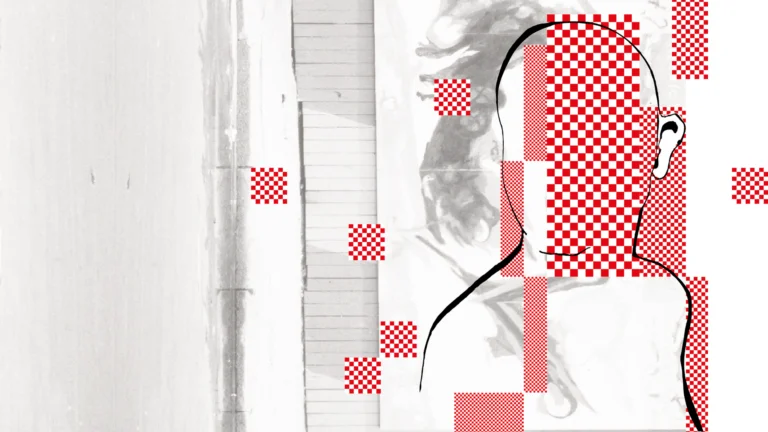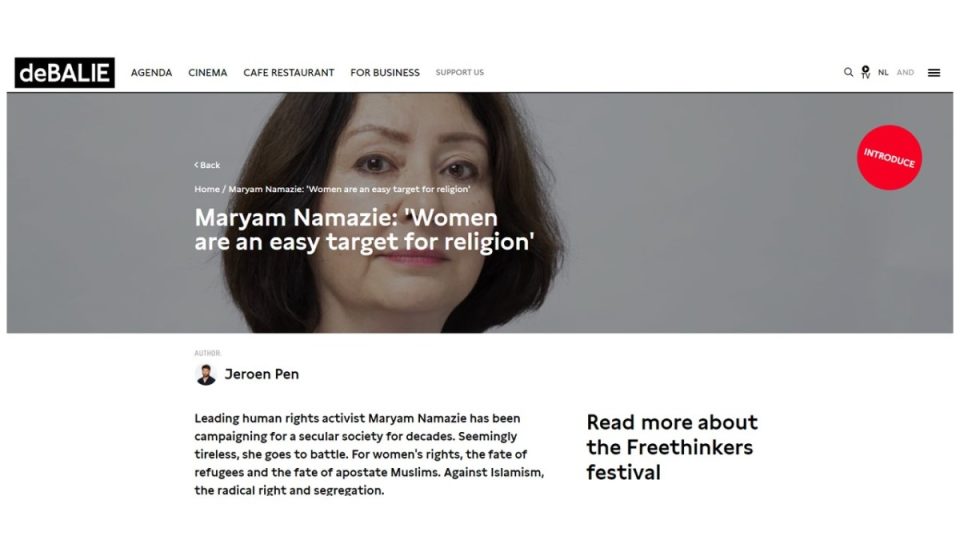Maryam Namazie: ‘Vrouwen zijn een makkelijk doelwit voor religie’, De Balie, 15 October 2021
English Translation:
Leading human rights activist Maryam Namazie has been campaigning for a secular society for decades. Seemingly tireless, she goes to battle. For women’s rights, the fate of refugees and the fate of apostate Muslims. Against Islamism, the radical right and segregation.
The life of Maryam Namazie from Tehran is about to begin when Ayatollah Khomeini proclaims the Islamic Republic of Iran in 1979. To the horror of her parents, who realize they have no time to lose. The country in which they hoped to raise their thirteen-year-old daughter has quickly turned into a totalitarian nightmare. They make a drastic but deliberate decision. Maryam does not become a junior, but a refugee. They will leave Iran within a year.
‘The first thing the new Islamic regime did was make the veil mandatory,’ recalls Namazie. She finishes her schooling in India, and in 1983 goes to university in America to study. Still at a very young age: she will be seventeen then. From that moment on, she has been working as a human rights activist. She is determined to support apostates, refugees and women. ‘Islamists and the radical right are obsessed with women’s bodies,’ she says. “They want to silence us, that we go through life veiled and tied up.”
She moved to the UK just after the turn of the century and made books, documentaries, talk shows and nude calendars. She also founded the Council of Ex-Muslims of Britain to help those who have lost faith . During the Freethinkers Festival she will discuss religion and patriarchy. The liberal feminist has no doubts about a connection: ‘Religion always focuses on women first, they are the easiest target.’
Read more about the Freethinkers festival

Freethinkers festival 2021: City air liberates
On Saturday 30 October Maryam Namazie will speak in De Balie about the bromance between religion and patriarchy. Also featuring: Deborah Feldman, Nazmiye Oral and Nikki Sterkenburg.
Original Dutch
Vooraanstaand mensenrechtenactivist Maryam Namazie zet zich al decennia in voor een seculiere samenleving. Schijnbaar onvermoeibaar trekt ze ten strijde. Vóór vrouwenrechten, het lot van vluchtelingen en het lot van afvallige moslims. Tegen islamisme, radicaal-rechts en segregatie.
Het leven van Maryam Namazie uit Teheran staat op het punt te beginnen als ayatollah Khomeini in 1979 de Islamitische Republiek Iran uitroept. Tot afgrijzen van haar ouders, die beseffen dat ze geen tijd te verliezen hebben. Het land waarin ze hun dertienjarige dochter hoopten groot te brengen is in een kort tijdbestek verworden tot een totalitaire nachtmerrie. Ze nemen een drastisch maar weloverwogen besluit. Maryam wordt geen brugklasser, maar vluchteling. Binnen een jaar verlaten ze Iran.
‘Het eerste wat het nieuwe islamitische regime deed was de sluier verplicht stellen,’ blikt Namazie terug. Ze maakt haar school af in India, en gaat in 1983 naar de univresiteit in Amerika om te studeren. Alsnog op piepjonge leeftijd: ze is dan zeventien. Vanaf dat moment timmert ze aan de weg als mensenrechtenactivist. Vastberaden zet ze zich in voor afvalligen, vluchtelingen en vrouwen. ‘Islamisten en radicaal-rechts zijn geobsedeerd door vrouwenlichamen,’ zegt ze daarover. ‘Ze willen ons monddood maken, dat we gesluierd en vastgebonden door het leven gaan.’
Ze verhuisde vlak na de eeuwwisseling naar het Verenigd Koninkrijk en maakte boeken, documentaires, talkshows en naaktkalenders. Ook richtte ze om geloofsverlaters te helpen de Council of Ex-Muslims of Britain op. Tijdens het Vrijdenkersfestival gaat ze in gesprek over religie en het patriarchaat. De vrijzinnige feminist twijfelt geen moment aan een verband: ‘Religie richt zich altijd als eerste op vrouwen, zij zijn het makkelijkste doelwit.’
Lees meer over het Vrijdenkers-festival
Vrijdenkersfestival 2021: Stadslucht maakt vrij
Op zaterdag 30 oktober spreekt Maryam Namazie in De Balie over de bromance tussen religie en het patriarchaat. Met verder: Deborah Feldman, Nazmiye Oral en Nikki Sterkenburg.

